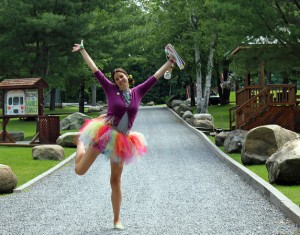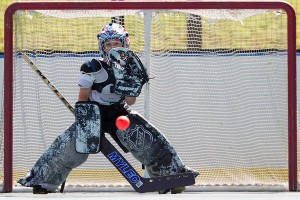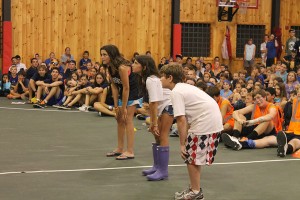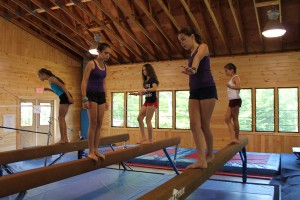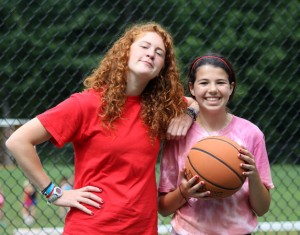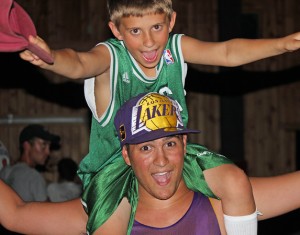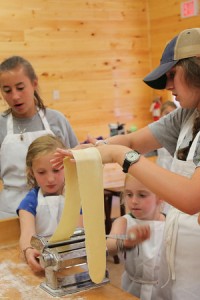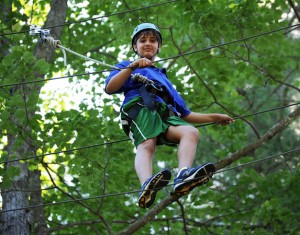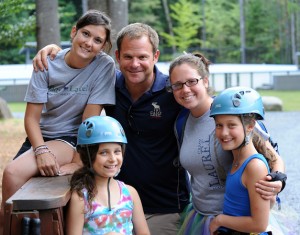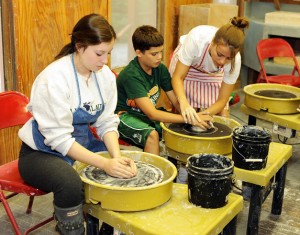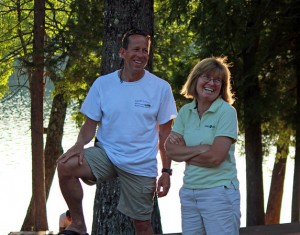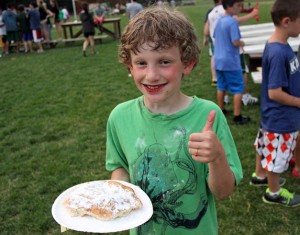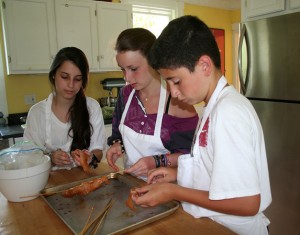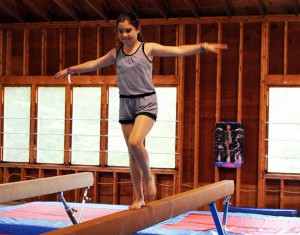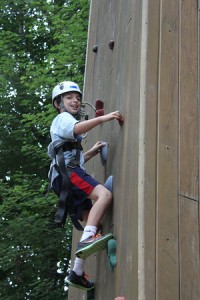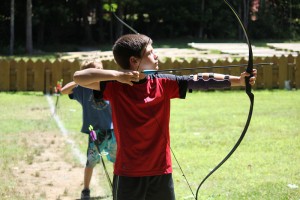 As long as there has been summer camp, archery has been a part of it. Although the amount of available activities at summer camp has grown immensely since the early days of camp, archery still remains popular. It’s a classic outdoor sport that doesn’t require the stamina or athletic prowess of, say, soccer, but a good eye, good aim, and precision when firing. There is a certain amount of satisfaction in being able to see yourself move closer to achieving a goal. It’s not always apparent that your swim stroke has gotten better since the beginning of the summer, or that your baseball pitch has improved over the past couple of weeks. Although your counselors and friends may compliment you and tell you that you’re better than you used to be, there isn’t really anything tangible for you to immediately be able to tell for yourself. With archery, however, there is a target with a bull’s-eye on it. It’s not at all unusual for campers to begin the summer not even being able to hit the target and then, as the summer moves along, hit and then inch closer and closer to the bull’s-eye. The closer they get to that bull’s-eye, the more arrows campers want to shoot.
As long as there has been summer camp, archery has been a part of it. Although the amount of available activities at summer camp has grown immensely since the early days of camp, archery still remains popular. It’s a classic outdoor sport that doesn’t require the stamina or athletic prowess of, say, soccer, but a good eye, good aim, and precision when firing. There is a certain amount of satisfaction in being able to see yourself move closer to achieving a goal. It’s not always apparent that your swim stroke has gotten better since the beginning of the summer, or that your baseball pitch has improved over the past couple of weeks. Although your counselors and friends may compliment you and tell you that you’re better than you used to be, there isn’t really anything tangible for you to immediately be able to tell for yourself. With archery, however, there is a target with a bull’s-eye on it. It’s not at all unusual for campers to begin the summer not even being able to hit the target and then, as the summer moves along, hit and then inch closer and closer to the bull’s-eye. The closer they get to that bull’s-eye, the more arrows campers want to shoot.
It seems like a small goal, and it is really. However, it’s still an exercise in goal setting. Hitting the bull’s-eye requires focus, and being focused requires you to survey your surroundings, determine where you need to aim, and then focus on the details as you attempt to hit your target. Being successful at archery requires this same effort from everyone. Campers have no advantage if they run faster, jump higher, or throw harder. Every camper enters the archery range on a level playing field with the same potential for hitting a bull’s-eye. Some get lucky, some work hard. Either way, archery promises a path to success for anyone who is willing to set a goal, take aim, and work hard. Perhaps that is why after decades of being a summer camp staple, archery remains one of the most popular activities.


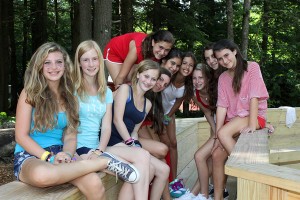
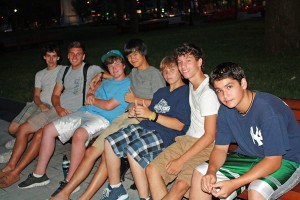
 campers’ lives as they play in carrying on its traditions. There are a lot of camp articles that sing the praises of summer camp for young children, but few focus on the value of the camp experience for young teens. By the time many campers reach their teens, they already have several camp summers behind them. For them, it’s not really about newness anymore, but reliability and tradition: who is at camp, what is at camp, camp rites to which they’ve looked forward since they were young. In a period of child’s life that can be a roller coaster full of ups and downs that come at full speed, summer camp is oasis of stability. It’s solid ground, a safe place where teenagers go to be themselves and to let loose of the stress and strain that are inextricably part of the teenage years.
campers’ lives as they play in carrying on its traditions. There are a lot of camp articles that sing the praises of summer camp for young children, but few focus on the value of the camp experience for young teens. By the time many campers reach their teens, they already have several camp summers behind them. For them, it’s not really about newness anymore, but reliability and tradition: who is at camp, what is at camp, camp rites to which they’ve looked forward since they were young. In a period of child’s life that can be a roller coaster full of ups and downs that come at full speed, summer camp is oasis of stability. It’s solid ground, a safe place where teenagers go to be themselves and to let loose of the stress and strain that are inextricably part of the teenage years. At summer camp, teenagers can still be young while getting a taste of what it means to be grown up. They connect with a small group of people with whom they’ve shared experiences since they were very young and with whom they continue to share experiences. They not only share experiences, they share memories that only a select group of others shares. Both give older campers a distinct sense of belonging. Regardless of who or what they are to their school peers the other ten months of the year, camp is a circle of inclusion that often extends far beyond the camp years. Older campers also benefit from privileges that come from being older. They’re tapped to lead camp activities, given leadership roles on teams of younger campers, and charged with being examples in honoring camp traditions. In short, older campers “train” younger campers how to be good campers. For many of them, being a role model and a mentor is one of the best aspects of camp. The pride in having played a role in a younger camper’s life is what brings many former campers back to camp in their adult years to work as counselors.
At summer camp, teenagers can still be young while getting a taste of what it means to be grown up. They connect with a small group of people with whom they’ve shared experiences since they were very young and with whom they continue to share experiences. They not only share experiences, they share memories that only a select group of others shares. Both give older campers a distinct sense of belonging. Regardless of who or what they are to their school peers the other ten months of the year, camp is a circle of inclusion that often extends far beyond the camp years. Older campers also benefit from privileges that come from being older. They’re tapped to lead camp activities, given leadership roles on teams of younger campers, and charged with being examples in honoring camp traditions. In short, older campers “train” younger campers how to be good campers. For many of them, being a role model and a mentor is one of the best aspects of camp. The pride in having played a role in a younger camper’s life is what brings many former campers back to camp in their adult years to work as counselors. sample career life through Apprentice type tasks, giving them the opportunity to write an essay for the camp blog, giving them a camera and letting them take photos for the camp website, helping them write a college essay or work through a summer reading assignment, or just talking to them about what life as a teacher or a coach is like. By the time campers reach their teenage years, they’ve learned to appreciate what staff members bring to the table and are eager to learn and listen. Ask any former camper to name a camp staff member who had a special impact on their lives, and within seconds they’ll share the story of a beloved counselor or staff member who taught them something about life that they still practice today.
sample career life through Apprentice type tasks, giving them the opportunity to write an essay for the camp blog, giving them a camera and letting them take photos for the camp website, helping them write a college essay or work through a summer reading assignment, or just talking to them about what life as a teacher or a coach is like. By the time campers reach their teenage years, they’ve learned to appreciate what staff members bring to the table and are eager to learn and listen. Ask any former camper to name a camp staff member who had a special impact on their lives, and within seconds they’ll share the story of a beloved counselor or staff member who taught them something about life that they still practice today. Although many bonds form when campers are young, some of the most special form when they’re older. Sometimes something as simple as a team building exercise helps teenage campers realize that they have more in common with a fellow camper than they thought they did. At an age when it’s all too easy to feel isolated, being able everyday to realize life as a valuable part of a whole translates into some of the most special memories of a camp career.
Although many bonds form when campers are young, some of the most special form when they’re older. Sometimes something as simple as a team building exercise helps teenage campers realize that they have more in common with a fellow camper than they thought they did. At an age when it’s all too easy to feel isolated, being able everyday to realize life as a valuable part of a whole translates into some of the most special memories of a camp career.
